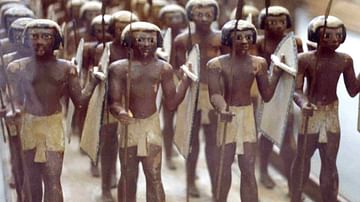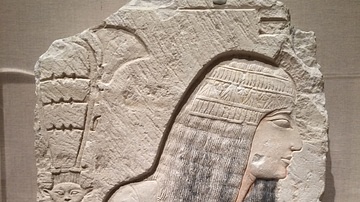Search
Did you mean: Vidar?
Search Results

Definition
Suppiluliuma I
Suppiluliuma I (1344-1322 BCE) is considered the most powerful and impressive king of the Hittite Empire. He was the son of Tudhaliya II (also known as Tudhaliya III) and is credited with founding the New Kingdom of the Hittites (also called...

Definition
Dur-Sharrukin
Dur-Sharrukin (modern Khorsabad, Iraq) was a city built by Sargon II of Assyria (r. 722-705 BCE) as his new capital between 717-706 BCE. The name means Fortress of Sargon and the building project became the king's near obsession as soon as...

Definition
Yazdegerd III
Yazdegerd III (r. 632-651) was the last monarch of the Sassanian Empire (224-651), ruling – or attempting to rule – amidst the chaos of its final decline and fall to the invading Muslim Arabs. He was the son of the prince Shahriyar (d. 628...

Definition
Perdiccas
Perdiccas (d. 321 BCE) was one of Alexander the Great's commanders, and after his death, custodian of the treasury, regent over Philip III and Alexander IV, and commander of the royal army. When Alexander the Great crossed the Hellespont...

Article
Food & Drink in Ancient Egypt
Food and drink in ancient Egypt relied on barley and wheat, the primary crops cultivated along the Nile. The Egyptian diet was based on bread, beer, and vegetables. Meat was expensive and only rarely eaten. The majority of people ate fairly...

Article
Jobs in Ancient Egypt
In ancient Egypt, the people sustained the government and the government reciprocated. Egypt had no cash economy until the coming of the Persians in 525 BCE. The people worked the land, the government collected the bounty and then distributed...

Article
Weapons in Ancient Egypt
The ancient Egyptian military is often imagined in modern films and other media as a heavily armed and disciplined fighting force equipped with powerful weapons. This depiction, however, is only true of the Egyptian army of the New Kingdom...

Article
Women's Work in Ancient Egypt
Women in ancient Egypt had greater rights than in any other civilization of the time. They could own land, initiate divorce, own and operate their own business, become scribes, priests, seers, dentists, and doctors. Although men were dominant...

Article
The Twelve Tribes of Israel
The Twelve Tribes of Israel refer to the sons of the Jewish Patriarch Jacob and are important for the tribal lineages of those who constituted the nation of Israel. In the ancient world, all ethnic groups developed stories of their ancestors...

Article
The Marduk Prophecy
The Marduk Prophecy is an Assyrian document dating to between 713-612 BCE found in a building known as The House of the Exorcist adjacent to a temple in the city of Ashur. It relates the travels of the statue of the Babylonian god Marduk...